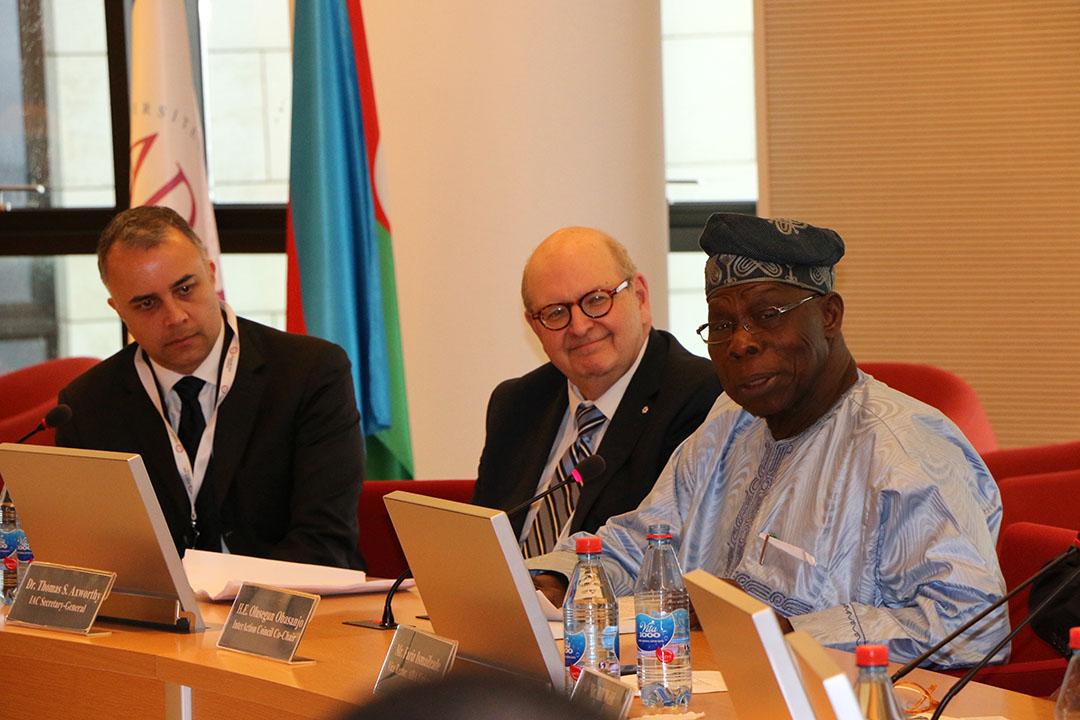
High-Level Expert Group Meeting
7 March 2016
ADA University, Baku
Chaired by Olusegun Obasanjo
In 2016, the world, once again, fears a significant economic slowdown. The global economy shuddered in 2008-2009 with a recession brought on by the predatory practices of the world’s banks, and ever since the recovery has been tepid. Since 2009, China and the United States have been the engines of growth. But in 2016, Chinese expansion is slowing with a major impact on a host of commodities. The rapid decline in the price of oil, for example, while welcome to oil importing nations and to consumers generally, has had severe negative repercussions for oil producing states like Saudi Arabia, Nigeria, Azerbaijan, and even Canada.
Beyond the short-term fluctuations of today’s world economy, significant structural changes are also occurring as a result of digitization and technological innovation. “These processes,” states a recent OECD forum, “coupled with globalization, population ageing, and changes in work organization, will shape the world of work and raise challenges to public policy in unknown ways.” New jobs and markets will be created as a result of technology, but many existing jobs and secure long-term employment will be destroyed or significantly altered. Many years ago the Harvard economist Joseph Schumpeter coined the paradoxical term “creative destruction” to describe such economic trends, and his phrase certainly seems apt in describing the current world economy.
The future of work is of concern to all, but it is especially relevant for young people about to enter the labour force. In many European countries youth unemployment is already at crisis levels: 48 per cent in Greece and Spain, 40 per cent in Italy, 30 per cent in Cyprus, 25 per cent in France. The average for the Euro area as a whole is 22 per cent. In Nigeria, youth unemployment is as high as 50 per cent. In India, 75 million youth are currently unemployed. In Saudi Arabia, some 70 per cent of the population is under the age of 30, and they too are having difficulty in finding jobs despite the wealth of the Kingdom. Despite the severity of this problem in many places there is complacency or even denial: Surveys by McKinsey & Company demonstrate that 75 per cent of college and university teachers believe that they are adequately preparing their students for the future work force but only 40 per cent of employers take the same view! Speaking in Davos in 2015, Mr. Dominic Barton, global managing director of McKinsey UK, starkly but aptly described the situation: “There is a sense that youth unemployment is more of a cocktail conversation right now, but we need to start seeing it as a pandemic.”
The IAC has long brought experts and former world leaders together to discuss the state of the world economy and to suggest reforms and needed action plans. In 2016, in Baku, Azerbaijan, the Council will convene an expert session on the world economy and the future of work with a special emphasis on the needs of youth.
The experts’ meeting will assess:
- While dealing with persistent joblessness how should policy makers confront the structural forces of globalization, demographic change, and technology, especially the digital revolution?
- At the World Economic Forum in 2016, much of the conversation regarding technology focused on robots and automation. As computer vision, Artificial Intelligence, and automation technologies improve, will technology become an inhibitor to jobs creation?
- Technology is a high growth, high wage sector. But opportunities in technology companies are not available to everyone. What can be done to make opportunity more available to all?
- Beyond macro responses to the world slow down in 2016 and specific policies to deal with adaptation to structural change, what concrete policies are necessary to deal with the current epidemic of youth unemployment, and what changes are needed in education and training to better match the skills of young people with the requirements of employers?
- What kind of action do young people want to see governments take?
- What is the role of the private sector?

